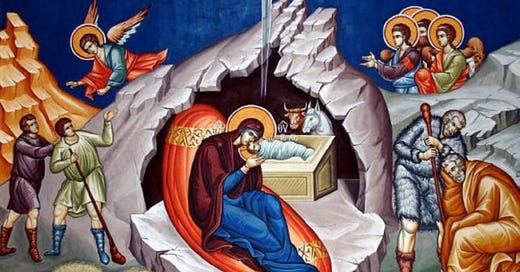The Interior Birth: Meister Eckhart
“Here in time we make holiday because the eternal birth which God the Father bore and bears unceasingly in eternity is now born in time, in human nature. St Augustine says this birth is always happening. But if it happens not in me what does it profit me? What matters is that it shall happen in me…. May the God who has been born again as man assist us in this birth, continually helping us, weak man, to be born again in him as God. Amen.”
The Fortunate Fall: Julian of Norwich
“When Adam fell, God's Son fell: because of the rightful oneing which had been made in heaven, God's Son might not [be disparted] from Adam. (For by Adam I understand All-Man.) Adam fell from life to death, into the deep of this wretched world, and after that into hell: God's Son fell with Adam, into the deep of the Maiden's womb, who was the fairest daughter of Adam; and for this end: to excuse Adam from blame in heaven and in earth; and mightily He fetched him out of hell.”
The Revelation of Spirit to Itself: Hegel
At Christmas, God makes Godself available as a being which is
a) self-conscious (a human spirit), but also
b) immediately and sensously present (able to be seen and touched).
Only at this moment do human beings realize that the Absolute is not alien and inaccessible but revealed. What is revealed is that we are included in the Absolute - and in this realization we return to ourselves as the Spirit we have always implicitly been.
“This incarnation of the divine Being, or the fact that it essentially and directly has the shape of self-consciousness, is the simple content of the absolute religion… Consequently, in this religion the divine Being is revealed. Its being revealed obviously consists in this, that what it is, is known. But it is known precisely in its being known as Spirit, as a Being that is essentially a self-conscious Being… It is the pure Notion, pure Thought or being-for-self which is immediately being, and consequently being for-an other, and as this being-for-an other is immediately returned into itself and in communion with itself; it is, therefore, that which is truly and alone revealed…. The hopes and expectations of the world up till now had pressed forward solely to this revelation, to behold what absolute Being is, and in it to find itself. The joy of beholding itself in absolute Being enters self-consciousness and seizes the whole world; for it is Spirit, it is the simple movement of those pure moments, which expresses just this: that only when absolute Being is beheld as an immediate self-consciousness is it known as Spirit.”
Beyond the Bare God: Karl Rahner
“God has become man. Alas, we say this with such ease, without giving the matter much thought, and (even when we have drummed into ourselves the exact orthodox formulae) we will so easily and not even infrequently understand something Monophysite or Nestorian by it.
We will only too easily conceive the man who has ‘become’ God (in this statement, ‘God’ is the subject and not the predicative term) as a kind of disguise, a livery of the ‘good God’ – so that basically God is after all merely the bare God, and one does not know whether he is really present where we are…
God is man: this does not mean that the ‘human’ in him is something which does not really concern him at all, something which is externally manipulated by him as a mere tool, something which, because it remains ‘unmixed’ and thus has been merely ‘assumed’ (beside him, even though by him) or added, does not really express anything about him and merely brings us, not him, into evidence. God is man, this really tells us something about God himself…
God’s human nature must not be identified in dead conformity with God’s divinity, nor must it be merely deposited beside God, like something dead which always simply falls back into itself something joined verbally to him by an empty ‘and’. When God manifests his humanity, then (since it is not something abstract) it always meets us in such a way that he himself is there, since this full and genuine humanity always is itself precisely because it is his and because it is human in absolute purity and perfection and is precisely his. Because we merely place the divinity and humanity side by side in the incarnate Word of the Father (almost merely speak of them side by side and one after the other), because we merely place their unity and distinction side by side as two expressions, instead of understanding that they both arise from one and the same common ground, although this common ground appears to us only in the twofold expression behind which it hides itself as a mystery . . . because of this, we are continually in danger of missing the exact point at which the blessed secret of Christmas finds in our self-transcending existence the place to incorporate itself into our life and history as our salvation.”




